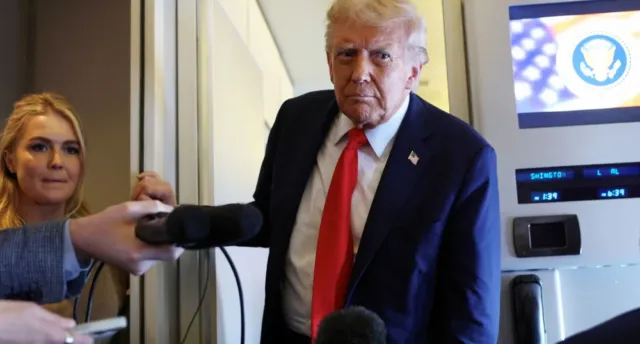
Trump Floats Revoking Broadcasters’ Licenses Over Perceived Negative Coverage
President Donald Trump on Thursday suggested that TV broadcasters could face the revocation of their federal licenses due to what he views as negative coverage of his administration. His remarks came a day after Disney’s ABC pulled “Jimmy Kimmel Live!” off the air.
Speaking to reporters, Trump indicated that the Federal Communications Commission (FCC) should consider revoking licenses, claiming that many late-night hosts on these networks are “against me” and provide “only bad publicity, press.” He did not specify which networks or hosts he was referring to.
The President’s comments have ignited a debate over freedom of the press and potential government overreach. Critics argue that threatening broadcasters’ licenses based on content is a direct violation of the First Amendment, which protects freedom of speech and the press. They contend that such actions could create a chilling effect, leading to self-censorship among journalists and media outlets.
Conversely, supporters of Trump’s position argue that broadcasters have a responsibility to present fair and balanced coverage. They claim that some networks exhibit a clear bias against the President and his policies, thus warranting scrutiny. They point to the FCC’s mandate to ensure that broadcasters serve the public interest, convenience, and necessity.
The FCC, an independent agency, is responsible for licensing and regulating broadcast television and radio stations. While the FCC has the authority to revoke licenses, such actions are rare and typically reserved for cases involving violations of technical standards, indecency regulations, or fraudulent activities. It remains uncertain whether the FCC would act on Trump’s suggestion.
The incident involving “Jimmy Kimmel Live!” adds another layer to the controversy. While ABC has not officially commented on why the show was temporarily removed, speculation suggests it may have been related to content deemed critical of the President or his administration. Others claimed technical difficulties. This has further fueled the debate about media bias and the role of entertainment in political discourse.
The President’s latest remarks underscore the ongoing tension between the White House and the media. Trump has repeatedly accused various news organizations of disseminating “fake news” and engaging in biased reporting. These accusations have intensified in recent months, leading to increased scrutiny of media coverage and heightened concerns about the future of press freedom in the United States.
The situation remains fluid, and it is unclear what actions, if any, the FCC will take. However, the President’s statements have undoubtedly sparked a significant debate about the role of the media, the limits of free speech, and the potential for government interference in news coverage.
The ramifications of these actions could be significant, impacting not only the media landscape but also the broader political climate.
Further developments are expected as the situation unfolds.
The ongoing dialogue between the government and media will be a key factor in determining the direction of the country’s political discourse.
The discussion over media responsibility and the consequences for its failure will only intensify.
The intersection of entertainment, news and politics will grow more complex and require great attention to detail.
The outcome of this situation will be observed by countries around the world and may provide insight into how nations regulate media in the future.
It is imperative that all information is verified before drawing firm conclusions.
The role of media outlets in reporting news and providing analysis continues to be discussed as society moves forward.
Understanding the motivations behind both the government and the media, including possible biases, is crucial to comprehending any situation.
The media’s independence must be preserved to guarantee that the public stays well-informed.
A careful examination of the facts is essential for formulating sound opinions and promoting effective participation in civic life.
Lastly, engaging in critical thinking empowers individuals to dissect facts, challenge presumptions, and seek a thorough understanding of the issues.
Disclaimer: This news article is based on publicly available information and may be subject to updates.




